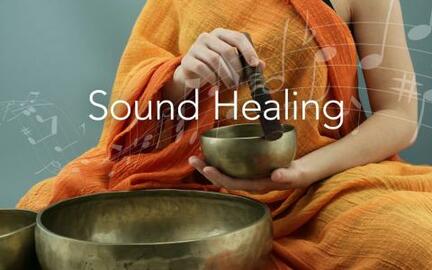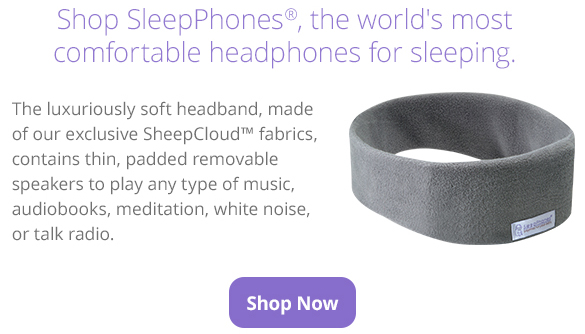Using SleepPhones® Sleep Headphones For Sound Healing
What Is Sound Healing Therapy?

a practitioner using singing bowls to create healing sounds
Sound therapy is an overarching term that refers to sensory treatments that use music and sound as therapeutic tools. Traditional sound therapy often includes instruments such as singing/sound bowls, gongs, chimes, and a relaxing voice.
However, depending on the goal of the listener and the practitioner, modern sound healing therapy may include a variety of sounds including:
History of Sound Therapy
Some researchers believe sound healing can be traced back over 40,000 years to aboriginal tribes in Australia and others point its origins to ancient Tibet.
Many cultures believe in music's healing abilities. Chanting, drumming, and singing are key elements of Native American and African healing ceremonies. The Peruvian Wacheripi tribe uses unique songs for different afflictions such as snake bites, headaches, and fevers. Grecians appealed to the gods through music to end conflicts and plagues.
While music has ancient roots, the formal study of music’s impacts on health only dates back to the 19th century. In the 1880s, a Parisian researcher named Diogel set out to discover whether or not patients who listened to live musicians could glean any health benefits. His findings showed that music could lower blood pressure, decrease heart rate, and calm the nervous system.
But as we gained more knowledge of disease prevention, invented better medical tools, and discovered vaccines, the scientific discoveries of the post-industrial revolution pushed music aided-healing aside. However, as more is known as to the potential side effects of sleep medications, people are finding themselves returning to more holistic treatments and therapies. With today’s advances in headphone technology and science-driven sleep sounds, it’s easier than ever to explore the power of sound healing and music therapy.
Is Sound Healing Scientifically Proven?
While sound healing is an ancient practice with roots in many cultures, any rigorous scientific investigation of it is relatively recent. So while many are curious as to whether it is 'scientifically proven,' a definitive 'yes' or 'no' answer is not yet available. However, emerging research, focusing less on mystical vibrations and more about measurable physiological responses to auditory stimuli, is beginning to uncover the ways specific sounds can impact our brains and bodies. One fascinating discovery is brainwave entrainment, which is the ability of sound frequencies to influence our brainwave activity. Low frequencies and rhythmic sounds, such as chanting or certain musical patterns, are thought to stimulate the vagus nerve, a major pathway connected to our "rest and digest" response, potentially reducing heart rate and promoting calmness. Studies have also demonstrated sound's ability to modulate activity in the amygdala, the brain's fear center, reducing feelings of anxiety and stress.
Though promising and enlightening, it is important to remember that this research is ongoing and complex. While the placebo effect can undoubtedly play a role in any wellness practice, the physiological effects observed - changes in brainwaves, nervous system activity, and hormone levels - suggest that sound can be a powerful tool for supporting overall wellbeing when used thoughtfully and in conjunction with other healthy habits. It is also important to note that sound healing isn't a cure-all and individual responses will vary. We believe in embracing both the wisdom of ancient practices and the power of modern science to understand how sound can truly enhance our lives.
How Does Sound Therapy Work?
Listening to pleasing music and sounds can release dopamine and serotonin, two neurotransmitters that are important for mood regulation, focus, and of course, sleep. There is also another school of thought that points to a phenomenon called brainwave entrainment.
Brainwave entrainment, also referred to as brainwave synchronization, is a method of stimulating the brain with sound (light and electromagnets can also be used). The goal behind entrainment/synchronization is to align one’s brain waves with brain-state frequencies associated with relaxation, happiness, and sleep.
Reported Effects of Sound Healing
New-age claims of sound healing’s effect on the body’s “energy” don’t quite hold up to peer review, although science has highlighted a variety of benefits that are research-based. For instance, a recent study published in PLoS One found that subjects who listened to relaxing music before a stress test not only performed better, but also recovered faster than those who listened to sounds of “rippling water” and those with no acoustic stimulation.
Another 2016 study published in the Journal of Evidence-Based Integrative Medicine suggested that sound meditation by way of a singing bowl can profoundly reduce tension, anger, anxiety, and depression, while also boosting feelings of spiritual-well being.
While more research is still needed to determine the exact mechanisms behind sound therapy, those who use it report:
- Reduced tension
- Reduced anxiety
- Improved sleep quality
- Improved memory
- Reduced pain
- Lowered blood pressure
- Improved blood circulation
- Reduced depression
How to Try Sound Healing for Yourself
Listening to music and healing sounds can help you address issues that impact your quality of life, such as anxiety, insomnia, and pain. Try incorporating it into your routine by:
-
Finding sounds that help you relax. Consider trying out the AcousticSheep Harmony Project, which algorithmically finds the right sounds and tunes for you.
-
Using a pair of headphones that are designed to be slept in. Earbuds and bulky over-the-ear headphones are uncomfortable to wear to bed.
-
Tune out distractions. Music and healing sounds can drown out intrusive noises that interfere with your sleep. However, we recommend turning off smartphone notifications while trying to fall asleep.

Sounds That Heal
For millennia, music and sound have been used across different cultures for healing. That impact remains as relevant today as it was then. If you’re ready to try sound therapy for yourself, consider using the world’s most comfortable headphone for sleeping, SleepPhones® headphones.
Some Tracks We've Found Healing
Ambient Music
Log cabin hideaway - blizzard sounds, howling wind and crackling log fire
ASMR
Qi Music Meditation for Balance | Himalayan Singing Bowls [ASMR]
Binaural Beats
528 Hz Positive Transformation, Emotional & Physical Healing, Anti Anxiety, Rebirth, Healing Music
Guided Meditations
Meeting Your Future Self, Guided Manifestation Meditation
Nature Sounds
The Meditative Sounds of the Sea • Deep Underwater
White Noise
CELESTIAL WHITE NOISE | Sleep Better, Reduce Stress, Calm Your Mind, Improve Focus | 10 Hour Ambient
